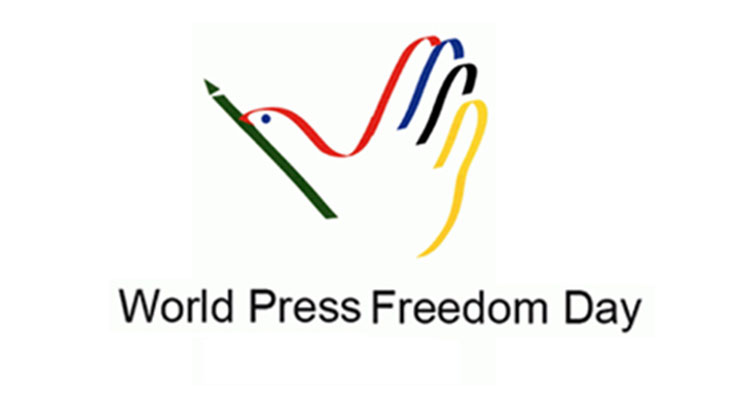The World Press Freedom Index has shown that the media is partly or completely restricted in 132 countries.
The revelation came to the fore as the World Press Freedom Day is being marked today across the globe. This year’s event is themed ‘Information as a Public Good’.
- LG polls: Mixed reactions as 38 aspirants fail Kaduna APC exams
- IPOB, aggrieved politicians behind mayhem in Imo – Uzodinma
At a time when it’s vital to have access to reliable information to combat COVID-19-related misinformation, journalism is restricted in well over two thirds of the globe. That’s according to data published by Reporters Without Borders.
RSF reported that 50 journalists from around the world died in the course of duty. Their deaths were linked to investigative stories about corruption, misuse of public funds, organised crime, and the coverage of protests. These assaults on press freedom occurred within the COVID-19 pandemic, which compounded existing problems.
According to the 2021 World Press Freedom Index, which measures curbs on access to information and obstacles to news coverage, journalism is “totally blocked or seriously impeded” in 73 nations and “constrained” in 59 others. Those 132 countries represent just over 73% of the 180 nations surveyed.
The pandemic and press freedom
In the Asia-Pacific region, authoritarian regimes have used the pandemic to “perfect their methods of totalitarian control of information, while the ‘dictatorial democracies’ have used coronavirus as a pretext for imposing especially repressive legislation with provisions combining propaganda with suppression of dissent,” according to RSF.
That includes Malaysia, which fell the most places on this year’s list, tumbling 18 spots to 119. Last month, the Malaysian government used new emergency powers to push through laws to make it a criminal offense to create, publish, or disseminate “fake news” relating to the virus or the proclamation of emergencies in the country. China maintained its spot at 177. The world’s most populous country “continues to take Internet censorship, surveillance and propaganda to unprecedented levels,” the report says, adding that the pandemic has exacerbated the trend. “Beijing has taken advantage of the COVID-19 pandemic to enhance its control over online information even more.” In Egypt (166), the government banned publication of non-government pandemic figures and arrested several people for circulating figures larger than the official numbers.
In Zimbabwe (down 4 at 130), an investigative reporter was arrested after exposing a scandal related to the procurement of COVID-19 supplies, while in Tanzania (124 on the list), the former president imposed an information blackout on the pandemic before he died in March 2021. Even in Norway, ranked the best country for press freedom for a fifth year, there were claims from journalists about the difficulty in accessing pandemic-related government information.
In India, which held its spot at 142, the government has used laws to silence government critics.
Meanwhile Thailand, the Philippines, Cambodia and Indonesia “adopted extremely draconian laws or decrees in the spring of 2020 criminalizing any criticism of the government’s actions and, in some cases, making the publication or broadcasting of false information punishable by several years in prison,” RSF said.
Positive improvement in Africa
Despite Africa being the most violent continent for journalists to work in, several African countries showed significant improvements in press freedom, according to RSF. Burundi jumped 13 spots to 147 after four independent journalists received a presidential pardon. Sierra Leone rose 10 places to 75 following the repeal of a decades-old criminal libel law that stifled free speech. Mali rose nine places to 99 after a marked decrease in the number of abuses against its journalists. Europe and the Americas are the most favorable regions for press freedom, according to RSF. Despite attacks on the media by former president Donald Trump, press freedom in the U.S. is considered “fairly good,” with the country ranked at 44 on the list.
Pandemic cannot become a ‘media extinction event’: UN Secretary-General
The financial decline of many public interest media organizations worldwide has been among the dangerous side-effects of the COVID-19 pandemic, Secretary-General António Guterres said on Wednesday in remarks to a UN-backed event to boost support for the sector.
With newspapers alone losing an estimated $30bn last year, “some fear that the pandemic could become a ‘media extinction event’”, he warned.
“We cannot afford to let this happen”, the UN chief said in pre-recorded message. “Maintaining independent, fact-based reporting is an essential global public good, critical to building a safer, healthier and greener future.”
Salary cuts, layoffs, mental health toll
That the pandemic is strangling media globally was confirmed in a survey of 1,400 English-speaking journalists and news managers in 125 countries, conducted by the International Centre for Journalists and Columbia University, both based in the United States.
Media depend on advertising revenues, and more than 40 per cent reported declines of between 50 and 75 per cent. The result has been salary cuts and staff layoffs “at a time when people desperately needed information”, said Joyce Barnathan, the ICFJ President.
Their “snapshot” also revealed the pandemic’s mental toll on the people who bring us the news.
Some 70 percent of journalists found the psychological and emotional impacts were the most difficult part of their work. Around one-third said their organizations had not provided them with protective equipment. A separate study found women journalists also reported “startling” attacks.

 Join Daily Trust WhatsApp Community For Quick Access To News and Happenings Around You.
Join Daily Trust WhatsApp Community For Quick Access To News and Happenings Around You.


